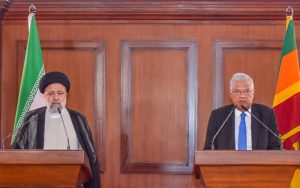Iranian President Ebrahim Raisi recently visited Sri Lanka, marking the first visit by an Iran’s head of government to the island nation in over 15 years. This visit comes against the backdrop of changing regional and global dynamics, all while Sri Lanka is gearing up for its presidential elections.
Iran is keen to expedite its economic partnership with Sri Lanka, which has been severely impacted by U.S. sanctions, while for Sri Lanka, increasing trade and securing foreign investments is critical at this juncture. Grappling with a severe economic crisis, Sri Lanka recently secured an IMF bailout package and the government continues to contend with public discontent stemming from high taxes and living expenses.
During his visit, Raisi met Sri Lankan President Ranil Wickremesinghe and signed agreements covering cooperation in economy, trade, science and technology, art, media, and tourism. Raisi inaugurated the Uma Oya hydropower and irrigation project, which was developed with Iranian assistance. Valued at $514 million, the project aims to irrigate land, provide drinking water, and contribute electricity to the national grid, particularly benefiting impoverished districts. The Uma Oya project had experienced significant delays largely due to the sanctions on Iran.
Wickremesinghe lauded the project as a symbol of South-South cooperation and said, “We all are countries that belong to the [Global] South at a time when the South now wants to establish its own identity and its own independence.”
Raisi criticized the current world order and asserted Iran’s resistance to the current international system reflecting upon the shared concerns of the Global South.
The Gaza war has garnered attention in Sri Lanka’s political discourse. Both Raisi and Wickremesinghe have advocated for a ceasefire in Gaza and criticized Western leaders for their “double standards” and “hypocrisy.” While Wickremesinghe has supported a ceasefire, he has also faced criticism from the opposition parties in Sri Lanka as the current government has actively pursued closer ties with the United States and Israel. Sri Lanka joined the naval alliance against the Houthis led by the U.S. and also recently signed an agreement to enhance air connectivity with Israel.
Iran seeks to broaden its economic partnerships, a goal emphasized by the Raisi administration. Iran aims to navigate its limitations amid sanctions, with a focus on fostering trade, economic cooperation, and maritime connectivity, all of which are foundational to the emerging ties between Iran and Sri Lanka.
On the other hand, Sri Lanka faces a severe economic crisis marked by political instability and mismanagement, with problems carried over from the previous governments of Mahinda and Gotabaya Rajapaksa. The country’s economic woes stem from corruption, nepotism, and reckless and unsustainable economic policies. Sri Lanka’s import-heavy economy coupled with dwindling reserves and a lack of foreign currency exacerbate the challenges, necessitating urgent measures to address the dire economic situation.
As per recent reports, cash-strapped Sri Lanka exported $20 million worth of tea to Iran to partially settle its $251 million oil debts. The barter trade agreement, reached in December 2021, enables Iran to acquire tea imports without depleting its foreign currency reserves amid sanctions.
The Iran-Sri Lanka relationship is a prime example of how external factors can change the course of bilateral economic engagement. Sri Lanka was one of the countries that swiftly complied with the U.S. sanctions on Iran and stopped importing oil from Iran. However, recent developments indicate the willingness of both countries to cooperate by identifying mutual interests and shared concerns. The domestic and geopolitical contexts contribute to this changing nature of engagement, especially as both countries are facing significant crises at home even while they have to adjust their foreign policy amid wider global geopolitical competition and tensions.
Iran understands the significance of Sri Lanka’s geostrategic location, particularly as the Iranian navy continues to assert its military strength and influence in the Indian Ocean Region (IOR). Sri Lanka’s proximity to critical sea routes, including the Malacca Strait and the Strait of Hormuz, further amplifies its significance for Iran’s interests, especially in safeguarding maritime trade and security. Iran aims to revitalize and expand opportunities for collaboration, fostering deeper ties with Sri Lanka to bolster its broader strategy of enhancing influence in the IOR. This aligns with Iran’s initiatives like the proposal to establish a naval alliance involving India and Pakistan.
With recent attempts to strengthen bilateral ties with South Asian countries, Iran intends to project its diplomatic clout both domestically and globally. Iran’s Supreme Leader Ayatollah Khamenei as well as Raisi and Iran’s Foreign Minister Amir Abdollahian have also asserted this on multiple occasions. To overcome its isolation, Iran has sought to reach out to countries grappling with economic or political challenges, positioning itself as an alternative, particularly in areas where it possesses technical expertise.
However, the viability of any partnership will hinge on Iran’s capacity to proficiently oversee its economy and refrain from direct involvement in any escalation of the Gaza war, which could potentially drag Iran to a bigger crisis.

































